Australia So Much to See

Fifty years ago, Donald Campbell set two speed records in Australia, on land and on water.
Bluebird was still and quiet on New Year’s Day 1965, basking in the glory of the achievement in breaking the world water speed record for Donald Campbell the day before. These were exciting times for the rural community of Dumbleyung, and our friends were farming not far from Lake Dumbleyung. We often visited them for New Year’s Day and a short drive to the lake, often to water ski and swim, was part of the day’s activities. This time we weren’t boating, but looking at the Bluebird. My sister took a photo of me leaning against the speedcraft.
Donald Campbell came to Western Australia following unsuccessful attempts on the water speed record at Lake Bonney, Barmera , South Australia. Barmera celebrates the 50th anniversary of this attempt with events and activities to be held on the foreshore of Lake Bonney, Barmera on the 22nd and 23rd November 2014. See more at K7 Project Bluebird
It was on 31 December 1964, during wetter seasons in the wheatbelt, that Donald Campbell set the water speed record in his boat 'Bluebird', reaching the average speed of 444.66 kilometres per hour over a kilometre stretch during two runs. Campbell had dominated the world water speed records for a decade. In doing so before the end of the year enabled Donald Campbell to gain a double in 1964, having broken the land speed record on Lake Eyre in South Australia on 17th July that year.
A memorial to Campbell stands on top of Pussycat Hill overlooking the lake. Campbell died in England two years later when he was attempting to break the record he had set at Lake Dumbleyung. His record was broken in 1967, and this was broken again by the record holder, Ken Warby, who then broke his own record when he achieved 511.12 kilometres per hour on Blowering Dam in 1978.
Lake Dumbleyung, a shallow salt pan, is the largest body of inland water in southern Western Australia. When full it covers an area of around thirteen by seven kilometres. Today the lake is used more for local recreation, and when we called in November 2009 the levels were a lot lower than in 1964.
Dumbleyung celebrates this 50th anniversary with a ceremony at the lake and events in town over 31st December 2015 and the 1st January 2015. See more at Dumbleyung Bluebird.
16th November 2014
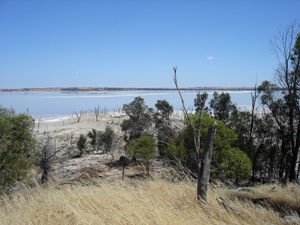
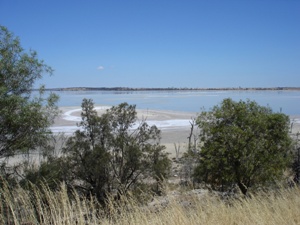
The Department of the Environment has stated it is necessary to have a greater contribution towards the
upkeep of the park.
“Currently visitors to Kakadu are heavily subsided. If they don’t make a larger contribution we could see
the park’s World Heritage values and visitor facilities decline. In the long run this would have a negative impact on the competitiveness
of Kakadu National Park as a destination of choice on the world stage.”
In summary:
Adult park pass will be higher in the dry season when more attractions are open and free ranger tours are on offer.
Dry season (April to October), an adult pass will cost $40.
Wet season (November to March), an adult pass will cost $25.
Discounts available:
A discount of 10 per cent will be introduced for anyone buying their ticket online.
A discount will be introduced for seniors, pensioners, disabled pensioners and their carers. For these concession card holders a pass will cost $19 in the wet season (November to March) and $30 in the dry season (April to October).
Children aged 5 to 15 years will pay half the adult entry fee. Children four years old and younger will remain free.
In the dry season (April to October), a child pass will cost $20.
In the wet season (November to March), a child pass will cost $12.50.
Family pass will be introduced which will cost $100 in the dry season (April to October) and $65 in the wet season (November to March). It will cover two adults and two or more children.
School groups: Children travelling in school groups will remain free, all year round.
Length of stay: Passes will be valid for seven days (rather than the current 14 days), but can be extended for another seven days at no charge if required.
Camping fees for adults will increase from $5 to $6 per person per night at unmanaged campgrounds with pit toilets only, and from $10 to $15 at managed campgrounds which have hot showers and toilets. These campgrounds do not have powered sites, but there are generator areas in some campgrounds. Children aged 5 to 15 years will pay half the adult price. A family camping rate will be $15 for unmanaged campgrounds and $38 per night for managed campgrounds. Remote campgrounds with no toilet facilities remain free.
Uluru-Kata Tjuta National Park
Entry of $25 per adult for a three day pass will remain unchanged, but fees at half the adult rate will be introduced for children aged 5 to 15 years. A family pass costing $65 will also be introduced.
10th December 2014
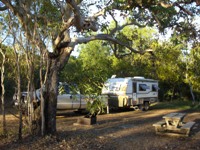
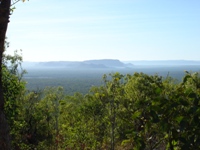
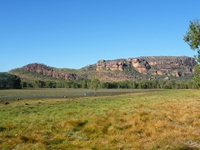
Thanks to Ballarat City Council and CMCA (Campervan and Motorhome Club of Australia) who worked with Council, a twelve month trial allowing free camping for self contained unit who must removed all waste including water from the site. Camping is permitted for up to 48 hours enabling visitors to see some of the sights at Ballarat.
6th December 2014

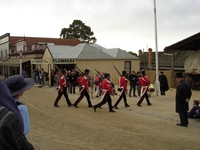
It's early morning on the 15th and the passengers are aboard with the train to Queenstown getting ready to leave.
Following the
closure of this railway journey between Queenstown and Strahan in western Tasmania last year, we followed the progress of the restoration
of the line and the opening in January this year of the Abt rack railway line from Queenstown climbing over the range as far
as Dubbil Barril. The continuation of the journey to Strahan was at that stage in future planning.
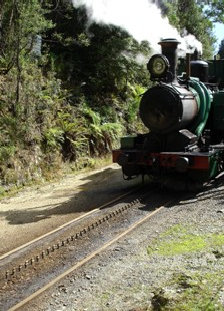
The Goymarr (Mary River) Roadhouse and accommodation is currently closed
The Goymarr (Mary River) Roadhouse which supplied fuel,
motel accommodation and a caravan park is currently closed. A new lessee is being sought. Goymarr is near the edge of Kakadu
National Park, on the Kakadu Highway.
Services and accommodation are available 62 kilometres away at Pine Creek. In additional to National Parks campgrounds which are unpowered, camping and other accommodation is available within the National Park at Cooinda on the Arnhem Highway, the town of Jabiru, and Aurora Kakadu resort on the Arnhem Highway. Fuel is also available at these three locations. See our Kakadu Travelogues.
2nd December 2014
Road closures and restrictions for the road into Gunlom, Cahill’s Crossing, and Old Jim Jim Road.
Gunlom is now closed
for the wet season because of the risk of flash flooding. The Gimbat Road leading to Gunlom is closed from the one lane South Alligator
River Bridge due to the river rising across the road. Yurmikmik Walks and Kambolgie are still accessible.
Cahill’s Crossing is currently at 0.8 metres and rising. It will be closed until water levels recede.
The Old Jim Jim Road is now closed due
to rising waters making the river crossings impassable.
Access to West Alligator Head beyond Four Mile Hole is now closed. Access to Bucket Billabong and Alligator Billabong remains closed. Red Lily Billabong is currently closed.
Visitors can still access both Two Mile and Four Mile holes at this stage.
Cahills Crossing is running at 0.5 metres and is being assessed for possible re-opening.
14th December 2014
Four Mile Hole Billabong is now closed, with Two Mile Hole Billabong still open to four wheel drive.
23rd December 2014
Due to recent rainfall places may close at short notice due to flash flooding.
Jim Jim Billabong is now closed. Access to Bucket Billabong and Alligator Billabong is now closed due to rising water levels.
Cahills Crossing is running at
one metre and will remain closed until water levels subside.
Red Lily Billabong is still open. Yurmikmik Walks and Kambolgie
campground are still accessible.
From 1st December 2014 Ubirr will only be accessible from 2 pm until sunset.
5th
December 2014